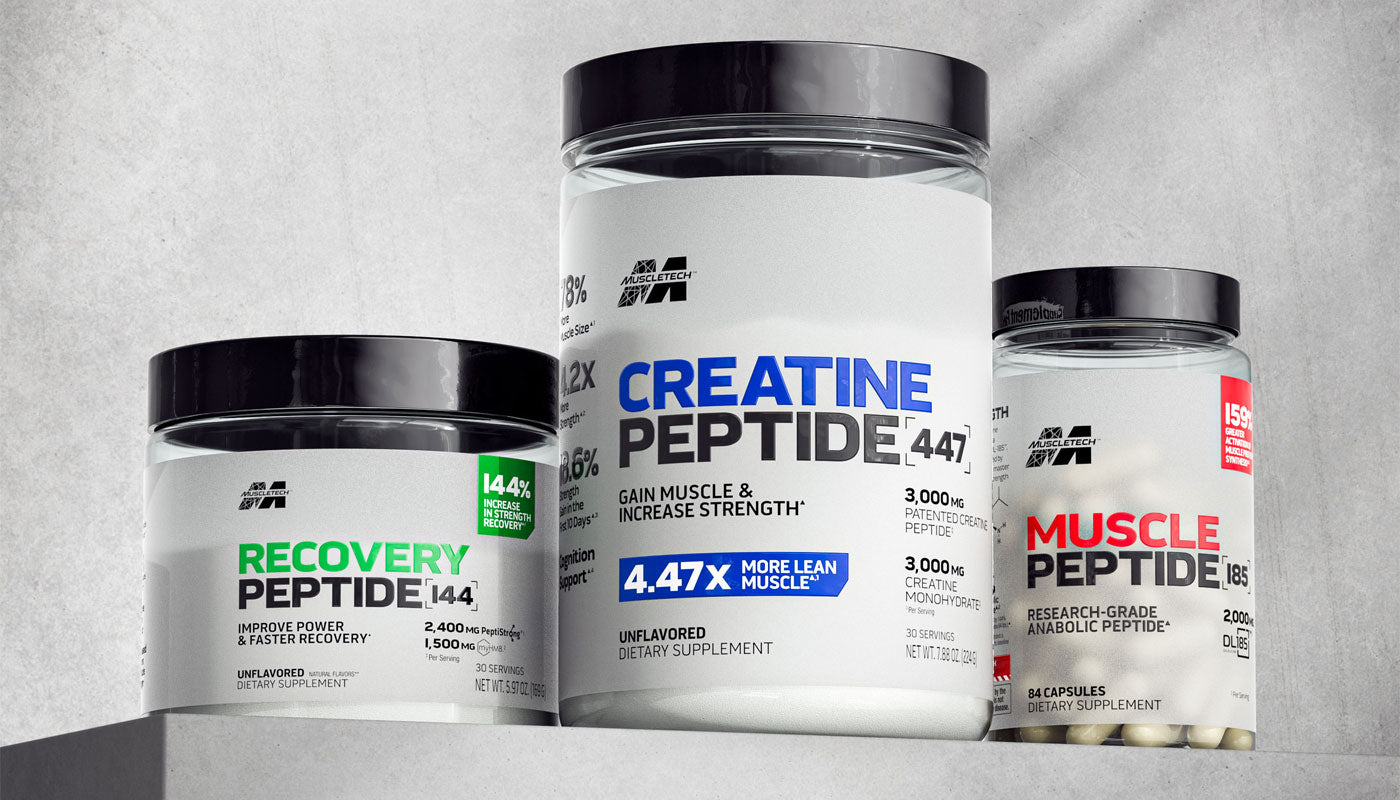Creatine is one of the most studied and used supplements in the fitness community.
It has a powerful effect on improving strength, increasing muscle mass, and enhancing performance for high-intensity activities. (1)
But, a common concern with creatine supplementation is that some who supplement with it complain of bloating.
This is of particular concern with people who are new to taking creatine and are unsure about how their body will respond to it.
If this is you, then you may be wondering if starting to supplement with creatine will leave you feeling “puffy” and potentially uncomfortable.
The short answer to will creatine make you bloated is, maybe, but not always and it is usually very mild and temporary.
Bloating with creatine use is more common with taking large doses or during the loading phase of proper supplementation. (2)
With correct dosing strategies and other techniques you can avoid bloating all together and minimize it if you are prone to bloating.
Below, we’ll review how creatine works in the body, why bloating can occur, how common it is, and what the research says about creatine supplementation risks.
As well as practical ways to minimize the possibility of bloating while you are taking creatine so that you can take advantage of the highly effective supplement.
Shop for Protein Powder with Creatine
Why Creatine May Cause Bloating?
How Creatine Works Within The Body?
Creatine improves your body's ability to generate energy during high-intensity activities such as heavy lifting, sprinting, jumping, etc.
By taking creatine daily, you effectively increase the amount of phosphocreatine that is stored within your muscle tissue.
With topped-off phosphocreatine levels, you are better able to regenerate adenosine triphosphate (ATP). (1)
ATP is the body's main energy source during the quick and explosive movements like the ones mentioned above.
However, along with an increase in phosphocreatine and subsequent ATP there is an effect on the water balance within the body.
Ultimately, this increases the likelihood of bloating.
Defining Intracellular Water Retention
As you supplement with creatine, it begins to accumulate within your muscle cells.
This also draws water into the cells in a process called intracellular water retention. (2)
The water moves into the muscle fibers themselves, which can give them a fuller and tighter appearance.
Some athletes may actually welcome this process as it provides a feeling of increased muscle girth.
But if that does not apply to you, then it is important to understand what this feeling means so that you can take steps to minimize it.
Despite what some believe regarding a feeling of gas in the gut causing bloating, with creatine supplementation, the feeling of fullness stems from increased water within the muscle. (2)
Intracellular vs Subcutaneous Water
As the name implies, intracellular water retention occurs within the muscle cells.
This differs from subcutaneous water retention, where the water collects under the skin and causes a soft, puffy look.
Intracellular water retention with creatine supplementation is within the muscle itself and is part of what helps improve strength and performance.
However, the typical discussion surrounding bloating refers to gastrointestinal bloating and subcutaneous bloating.
Which creatine rarely causes at the recommended doses.
Why This Feels Like Bloating?
After a few days of consuming creatine, you may notice that your muscles feel a little bigger and tighter. (3)
This may feel like traditional bloating, especially if it is unfamiliar to you or if you've never experienced changes in muscle volume before.
Additionally, if you take large doses of creatine, you may feel discomfort in your stomach or other gastrointestinal symptoms.
However, these symptoms and the muscle fullness are different then what you may believe them to be.
What this actually is a positive response to the supplement, where there is increased water in the muscle as part of creatine's process to improve training capacity.
How The Loading Phase Contributes To Bloating?
The “loading phase” is a strategy for fully saturation the muscles with creatine as fast as possible. (1)
This phase takes place during the initial 5-7 days of creatine supplementation and calls for 20-25 grams of creatine per day in 2-4 doses. By starting out your supplementation with a loading phase and saturation your muscles with creatine, you are able to experience its effects more quickly.
Thus, the sooner it can have an effect on your training, the sooner you can begin to realize newfound gains.
But while the loading phase is highly effective at increasing creatine levels quickly, it can come with an influx of water into the muscle. (2)
Since the daily dose in the loading phase is much higher in the maintenance phase (5g per day), it is more likely to cause a temporary sense of bloating or puffiness.
This phase is also a common period for people to report gastrointestinal symptoms stated above, such as diarrhea and general discomfort. (1)
These will generally subside as you become accustomed to supplementing with creatine and exit the loading phase.
But they can sometimes be enough to make the loading phase feel unpleasant.
What The Literature Shows on Creatine?
One of the other reasons why creatine is such a popular supplement is that it has been proven over and over again to be a safe supplement to consume. (1)
The Journal of International Society of Sports Nutrition has published many studies and reviews that indicate creatine supplementation is generally well tolerated and doesn’t produce harmful side effects in healthy people.
They show that while water retention may occur, it is generally mild and temporary and is not the same as general bloating or hormonal changes.
They also concur that this type of water retention, as a result of creatine supplementation, helps support muscle performance and size. (2)
In a study on elite athletes, the effects of a single high dose of creatine were examined for the potential for gastrointestinal symptoms.
In line with what we have reviewed above, when the athletes took a single dose of 10 grams at once, their likelihood of gastrointestinal symptoms increased. (4)
But when the dose was split into two servings, the rise in bloating was not higher than the group consuming a placebo. (4)
This suggests that the way you consume creatine can play a role in the symptoms you experience versus the supplement itself.
There have also been long-term studies done on creatine that observe its effects over weeks and months.
As the body adapts to consuming creatine, there will be a normalization of fluid balance and the symptoms will become less noticeable. (2)
How you react to creatine supplementation will always be individualized to your own body, but for most people bloating and water retention are a minor inconvenience for major performance improvements.
Practical Ways to Minimize Bloating
1. Adhere to Proper Daily Dosing
One of the most effective ways to reduce the chances of bloating (and other unwanted side effects) is to stick to the recommended servings of 5 grams per day.
This amount of creatine is enough to maintain the creatine stores that were built up during the loading phase.
Especially if you regularly consume red meat and fish products, as these contain creatine in as well. (1)
As we have established, the higher the dose per serving, the more likely you are to experience unwanted side effects.
Fortunately, most creatine supplements provide a scoop that is already pre-measured to 5 grams.
So, to make this easy, simply consume one scoop per day, and you can effectively minimize any distress.
2. Modify the Loading Phase (or Avoid it)
If you are concerned about bloating, you can consider skipping the loading phase completely.
While it is clear that the loading phase is the preferred method for saturating your creatine stores effectively and rapidly, it's no secret that it can cause some distress.
You can opt to skip the loading phase, or you can modify it to suit your needs.
But be aware that creatine's effect on your performance is correlated with the amount of it within the muscles.
So, the more quickly you can fully saturate our creatine stores, the sooner you will see gains.
It is possible to saturate your muscles without the loading phase, but it will take significantly longer.
Some potential options for modifying the loading phase include:
Decreasing the total daily amount to between 10-20 grams instead of 20-25 grams
Splitting up the 20-25 grams into smaller doses
Taking your creatine with a meal and not on an empty stomach
Shorten the loading phase to 3-5 days
A combination of all four
3. Stay Hydrated
Staying hydrated while supplementing with creatine can help dampen the feelings of bloating.
Since creatine draws fluid into the muscle cells, it’s essential to stay hydrated to support your body's hydration
When you are properly hydrated, it helps your body distribute water better and avoid water retention and concentrating in one area. (5)
Staying hydrated can also help your kidneys process creatine more efficiently and reduce the risk of other signs of discomfort.
Aim to drink water throughout the day.
A good general rule of thumb is to consume half your body weight in ounces throughout the day to ensure you reach your hydration needs.
As well as monitor the color of your urine to assess if you are underhydrating (darker color) or overhydrating (too clear a color).
4. Manage Sodium Intake
Sodium is an essential mineral for total body health.
But it can have an effect on your fluid retention, and excess salt in your diet can exacerbate feelings of bloat.
If you are already experiencing water retention from creatine or want to ensure you don’t, try to avoid any excess sodium in your diet.
To help manage your sensations of bloating, stick to the recommended intake for sodium, which is around 2,300 mg per day. (6)
5. Introduce Creatine Gradually
Although we have established that sensations of bloating and puffiness are usually associated with larger doses, such as those found in the loading phase, you may want to take additional steps to avoid them.
In this case, you may consider introducing creatine more gradually and under the recommended serving of 5 grams per day.
You could begin with 3 grams for several days or weeks and then increase to 5 grams as your body acclimates to it.
Although you may sacrifice some initial performance improvements with this approach, you will be able to minimize unwanted side effects.
Should You Be Concerned About Feeling Bloated With Creatine?
The short answer is no, feelings of bloating or puffiness when taking creatine are not a cause for concern.
It is a byproduct of the supplement and is intracellular, not subcutaneous, and not a sign of inflammation or poor digestion.
To the contrary, this process will help to enhance your muscle function and growth as adequately hydrated muscles are more efficient during exercise.
The puffiness experienced while taking creatine is purely cosmetic and, in some cases, is actually a welcomed side effect for those looking to build a more muscular physique.
If you are consuming creatine to enhance your performance, the benefits of proper supplementation far outweigh any side effects of appearance that may come with it.
Especially given that it is generally a short-term issue, if at all.
Which Creatine Supplement is Right for Me?
If you’re looking for a high-quality creatine supplement to reap the benefits it has to offer, then look no further than MuscleTech’s Platinum 100% Creatine.
It is a no-frills all all-business creatine supplement that delivers 5 of HPLC-tested and third-party verified pure creatine.
With absolutely zero additives or fillers.
Just exactly what you need to minimize bloating and maximize your training gains.
It is also unflavored, so it can be mixed with any type of drink you’d like, which makes it a convenient option.
Simply grab whichever drink you have on hand, add your dose of creatine, and be on your way to the gym.
Wrapping Up on Bloating and Creatine
The bottom line is that creatine may cause initial bloating.
But it is usually mild and temporary and occurs most frequently during a loading phase or with larger doses.
If you are someone who is concerned about bloating, modifying the loading phase or the maintenance dose are a few ways in which you can help minimize it.
Remember, however, that the increased intracellular water is part of the supplementation process, and you will typically benefit from increased hydration within your muscles.
If creatine is a supplement you would like to try but are concerned about bloating, give it a shot and use this article as a guide. Experiment with different dosing strategies and take some time to find what works best for our body, and start making gains.
References:
Kreider, R. B., Kalman, D. S., Antonio, J., Ziegenfuss, T. N., Wildman, R., Collins, R., Candow, D. G., Kleiner, S. M., Almada, A. L., & Lopez, H. L. (2017). International Society of Sports Nutrition position stand: safety and efficacy of creatine supplementation in exercise, sport, and medicine. Journal of the International Society of Sports Nutrition, 14, 18. https://doi.org/10.1186/s12970-017-0173-z
Naderi, A., de Oliveira, E. P., Ziegenfuss, T. N., & Willems, M. T. (2016). Timing, Optimal Dose and Intake Duration of Dietary Supplements with Evidence-Based Use in Sports Nutrition. Journal of exercise nutrition & biochemistry, 20(4), 1–12. https://doi.org/10.20463/jenb.2016.0031
Cooper, R., Naclerio, F., Allgrove, J., & Jimenez, A. (2012). Creatine supplementation with specific view to exercise/sports performance: an update. Journal of the International Society of Sports Nutrition, 9(1), 33. https://doi.org/10.1186/1550-2783-9-33
Ostojic, S. M., & Ahmetovic, Z. (2008). Gastrointestinal distress after creatine supplementation in athletes: are side effects dose dependent?. Research in sports medicine (Print), 16(1), 15–22. https://doi.org/10.1080/15438620701693280
Zhang, J., Zhang, N., Li, Y., He, H., Song, G., Chen, J., Yan, Y., & Ma, G. (2024). Habitual water intake impacted the body composition of young male athletes in free-living conditions: a cross-sectional study. Frontiers in sports and active living, 6, 1458242. https://doi.org/10.3389/fspor.2024.1458242
U.S. Food and Drug Administration. (n.d.). Sodium in your diet. U.S. Department of Health and Human Services. Retrieved May 14, 2025, from https://www.fda.gov/food/nutrition-education-resources-materials/sodium-your-diet




